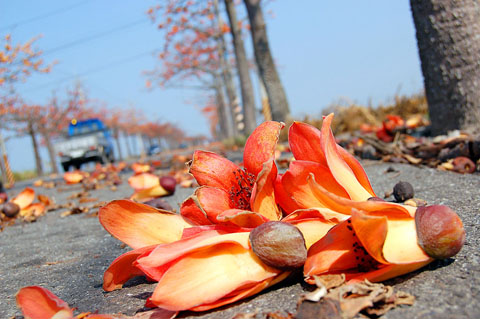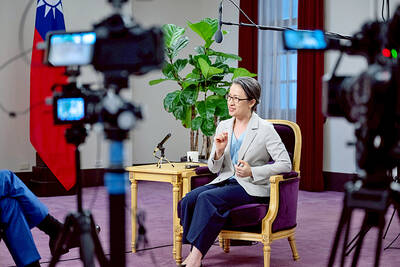Spring has arrived, and with it comes the dilemma of what to do about thousands of kapok trees lining roads across the nation. The kapok tree’s bright, cheery flowers may inspire local governments to dot their cities with them, but motorists and pedestrians alike have long complained that they are irritating and a hazard.
The problem with the trees has highlighted a battle between nature and modernization and reflects the change that has taken place in society over the decades.
The trees, which grow to about 60m tall, bloom in April. The palm-sized lily-like blossoms in red, pink or orange may make the perfect backdrops for photos, but once the slippery blooms fall to the ground, they have been known to cause scooter accidents or cause pedestrians to slip and fall.

PHOTO: CHEN YI-MIN, TAIPEI TIMES
The flowers also get stuck on windshields and the light, cotton-like filling of the tree’s large seed pods — which form a month after the tree blooms — can irritate those with respiratory problems.
The pods, the size of large mangoes, open up to release the fluffy filling with small seeds, which are carried around by the wind. Some people have also complained that the flowers stink after being crushed by cars or pedestrians.
City and county governments across the nation are unsure what to do about the trees after being inundated by complaints from residents about them. Local governments are faced with having to decide whether to spend copious amounts of time and resources moving the trees — which could harm their roots and kill them — or maintain them in their present locations despite the grumbling.
Those who despise the trees and those who love them are locked in a tug of war.
A dispute over whether or not to remove the trees in Tungshih Township (東勢鎮) in Taichung County has continued for three years. Six village heads have registered complaints about the trees on behalf of residents and appealed to the township office to cut down approximately 900 kapok trees in 2005.
In the end, because of increasing concern for the environment and considering that many residents enjoyed the trees, local authorities chose to transplant the trees away from roads, said Chen Ching-tung (陳晴東), the township office’s construction section chief.
However, the Ecological Conservation and Environmental Protection Association of Ta-Chia Stream in Taichung County urged the local government to leave the trees where they were, arguing that only a minority of residents were bothered by them and that transplantation could kill the trees, which were decades-old.
“The roots of the trees could be hurt in the transplantation process, which would lead to them dying,” an executive of the association said.
Kapoks, also known as Ceiba or Silk Cotton trees, were once a star on Taiwan’s floral list, voted as the official flower of Kaohsiung City and Taichung County by local residents in the 1980s.
The local governments of Kaohsiung and Taichung began planting the trees in wide areas following the vote, aiming to make the flowers a symbol of the area.
The trees have also had practical uses in the past. The flowers, pods and cottony filling were used in children’s toys decades ago. Kapok petals were also used in teas and dishes and the “cotton” was used to stuff pillows.
Still, the kapok, which was introduced from India in the 17th century, is deeply intertwined with many people’s childhood memories, which has led to a campaign to preserve the trees, some of which may be hundreds of years old.
In Tatu Township (大肚), Taichung County, an offer to move the trees has not been enough to convince residents who want to keep the trees. The township moved 960 kapok trees from schools and main roads to a park last year, but complaints persist, as unhappy county councilors and residents say the park is not far enough away for the trees to cease being a nuisance.
“Taichung County now has less than 3,000 kapok trees lining main roads, not including the 960 already transplanted, “ said Lin Hung-wen (林鴻文), chief of the county’s road maintenance section.
Fengyuan City, Taichung County, chose to send fire brigade wagons to “shoot down” ripe seeds with water hoses to prevent the pods from opening.
While the issue of finding a home for the trees is undecided in Taichung County, Changhua County is trying to use the trees to promote tourism.
Changhua County’s Pitou Township (埤頭) kicked off its first campaign last week to promote tourism during the kapok tree flowering season along a 4.5km riverside road, which has about 670 kapok trees.
They timed the campaign during the Tomb Sweeping Festival in hopes of drawing more tourists and boosting the local economy.
A series of activities were held to celebrate the flower season, with local schools performing music and dance and presenting sweet broths and cakes made of kapok blossoms.
“We are hoping that the flower season will help create business opportunities for local industries,” Pitou Township official Chen Tsang-chiung (陳滄炅) said, adding that since the flower season was attracting many visitors, the township office had decided to plant more kapok trees on the other side of the same road to create a grander view.
Advocates of keeping the kapok trees said they hoped the economic benefits of tourism would protect the kapok.
Regardless of whether the trees remain or are transplanted, efforts are needed to take care of the trees to ensure they are in good health.
The executive at the Ta-Chia Stream group said that without proper care and an appropriate environment, the trees will continue to cause problems, even if they are moved.
Tungshih Township, which still has not decided whether to move the trees, has cleaning teams to pick up fallen flowers every day and plans to remove the pods before they open.
Chen said that the township office will hold a public hearing next month on whether or not to move the trees.
“No major complaints have come in recently, but the problem still has to be solved, “ Chen said.

China might accelerate its strategic actions toward Taiwan, the South China Sea and across the first island chain, after the US officially entered a military conflict with Iran, as Beijing would perceive Washington as incapable of fighting a two-front war, a military expert said yesterday. The US’ ongoing conflict with Iran is not merely an act of retaliation or a “delaying tactic,” but a strategic military campaign aimed at dismantling Tehran’s nuclear capabilities and reshaping the regional order in the Middle East, said National Defense University distinguished adjunct lecturer Holmes Liao (廖宏祥), former McDonnell Douglas Aerospace representative in Taiwan. If

TO BE APPEALED: The environment ministry said coal reduction goals had to be reached within two months, which was against the principle of legitimate expectation The Taipei High Administrative Court on Thursday ruled in favor of the Taichung Environmental Protection Bureau in its administrative litigation against the Ministry of Environment for the rescission of a NT$18 million fine (US$609,570) imposed by the bureau on the Taichung Power Plant in 2019 for alleged excess coal power generation. The bureau in November 2019 revised what it said was a “slip of the pen” in the text of the operating permit granted to the plant — which is run by Taiwan Power Co (Taipower) — in October 2017. The permit originally read: “reduce coal use by 40 percent from Jan.

‘SPEY’ REACTION: Beijing said its Eastern Theater Command ‘organized troops to monitor and guard the entire process’ of a Taiwan Strait transit China sent 74 warplanes toward Taiwan between late Thursday and early yesterday, 61 of which crossed the median line in the Taiwan Strait. It was not clear why so many planes were scrambled, said the Ministry of National Defense, which tabulated the flights. The aircraft were sent in two separate tranches, the ministry said. The Ministry of Foreign Affairs on Thursday “confirmed and welcomed” a transit by the British Royal Navy’s HMS Spey, a River-class offshore patrol vessel, through the Taiwan Strait a day earlier. The ship’s transit “once again [reaffirmed the Strait’s] status as international waters,” the foreign ministry said. “Such transits by

Taiwan is doing everything it can to prevent a military conflict with China, including building up asymmetric defense capabilities and fortifying public resilience, Vice President Hsiao Bi-khim (蕭美琴) said in a recent interview. “Everything we are doing is to prevent a conflict from happening, whether it is 2027 or before that or beyond that,” Hsiao told American podcaster Shawn Ryan of the Shawn Ryan Show. She was referring to a timeline cited by several US military and intelligence officials, who said Chinese President Xi Jinping (習近平) had instructed the Chinese People’s Liberation Army to be ready to take military action against Taiwan